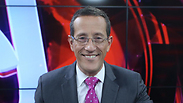
CNN analyst: Israel housing market not a bubble
Network's leading business journalist says in Ynet studio interview that Israel is in good shape after global financial crisis. But when you look underneath 'you start to see some tensions in economy'
The Israeli housing market is a "rising, frothy market," but not a bubble, Richard Quest, CNN's foremost international business correspondent, said in a Ynet interview.
Quest said the fashionable thing to say is for the housing market to be in a bubble.
But, is it really?
"The short and clear, probable answer is not really," Quest said. "What you have is a rising, frothy market. But that's not the same thing as a bubble."
The normal, traditional method to solve this type of problem, he said, is to jack up interest rates.
"Well, that's not available because of other economic issues," Quest said. "You don't want to slow down the economy and you don't want to appreciate the currency."
Quest recommended using liquidity, mortgage with low ratios and income to debt ratios.
"You have to use all other things to try to take the heat out of the market," he said. "Because what you don't want to do is take a pin out and burst the bubble. If there was a bubble."
Quest also took a favorable look at the Israel economy on the surface.
"If you look at the numbers, Israel's economy seems to be doing very nicely. You have a growth of 3.4% to 3.6%, unemployment seems to be steady, inflation is just about non-existent, and a worsening budget deficit is getting better."
But despite the positive outlook he was certain that not everything was as rosy as it seemed.
"You have to look under the water to really see what's happening. And when you look under the water you start to see some tensions in the Israeli economy," he said. "For instance, you do have rising house prices, you do have a growing level of inequality, and you do have, as the OECD mentioned, higher levels of relative poverty."
Quest warned that despite Israel's strong current position, it still has concerns that it hasn't dealt with from before the global financial crisis.
"The danger is that Israel hasn't addressed some of the structural issues, the sort of issues that led to protests a few years ago, the sort of issues that were the bedrock of the last election."











